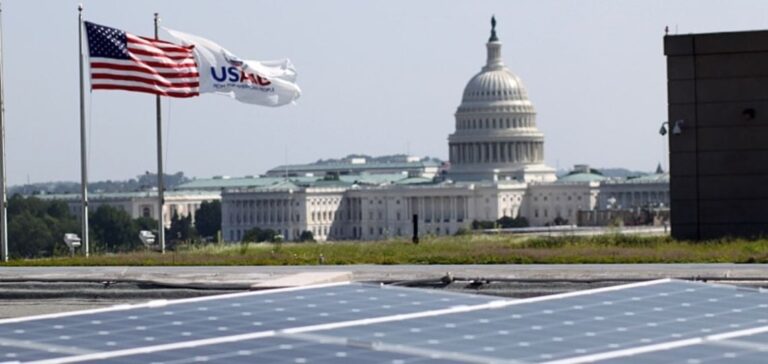The US clean energy industry is closely watching the political scene ahead of the 2024 presidential and congressional elections.
The Inflation Reduction Act (IRA), passed two years ago with $370 billion to support energy and climate initiatives, has already leveraged $126 billion in private investment in renewable energy production and manufacturing.
However, the election results could lead to significant adjustments to this key legislation.
Political scenarios and potential consequences
Several political configurations are envisaged for the next election cycle.
A first scenario foresees the victory of Vice President Kamala Harris, accompanied by a Republican Senate and a Democratic House of Representatives.
A second envisages the return of former President Donald Trump, with a Republican majority in the Senate and a House still controlled by the Democrats.
Finally, total Republican domination of the White House and both houses of Congress is also possible.
Each of these situations could have a different impact on the implementation and sustainability of the IRA.
Low probability of a complete repeal of the IRA
Despite the political uncertainties, a total repeal of the Inflation Reduction Act seems unlikely, even in the event of full Republican control.
Colin Silver, Vice President of Content and Strategy at the Solar Energy Industries Association (SEIA), points to the popularity of individual IRA measures across the political and geographic spectrum.
Previous attempts to repeal major legislation, such as the Affordable Care Act in 2017, have failed, illustrating the complexity of such legislative moves.
Possible budget adjustments
Regardless of the election outcome, the next Congress will have to address crucial budget issues, including raising the debt ceiling and the expiration of tax cuts introduced under the Trump administration.
These issues could provide the context for targeted changes to the IRA, such as narrowing tax credits for solar and energy storage projects or adjusting tax bonuses tied to wage and apprenticeship requirements.
These changes would probably be introduced discreetly within larger budgetary or tax packages.
Impact on project implementation and pace
The course of the election could also influence the speed of implementation of IRA-related guidance and funding.
A Trump administration could slow down these processes, causing further delays for many clean energy projects already affected by delays in technical guidance from federal agencies such as the Treasury Department.
Conversely, a Kamala Harris victory would likely guarantee the continuity and stability needed to continue current initiatives.
Investor concerns and future prospects
Political uncertainties are causing concern among investors in the energy sector, who fear an erosion of confidence and a possible redirection of capital to other markets.
Maintaining the current momentum requires a stable and predictable political environment, an essential condition to support ongoing investment in infrastructure and renewable energy technologies across the country.






















